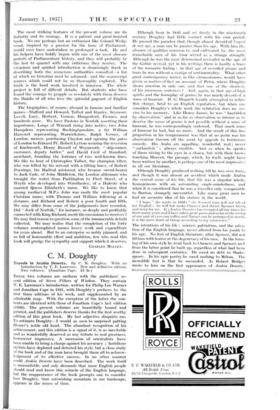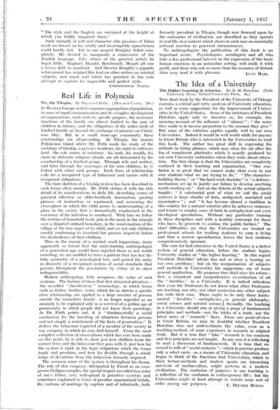C. M. Doughty
Travels in Arabia Deserta. By C. M. Doughty. With an . Introduction by T. E. Lawrence. New and definitive edition. Two volumes. (Jonathan Cape. £3 3s.) THESE two volumes are uniform with the publishers' re- cent edition of Seven Pillars of Wisdom. They contain T. E. Lawrence's introduction, written for Philip Lee Warner and Jonathan Cape in 1921, with Doughty's prefaces to the first three editions of his work, and supplemented by an admirable map. With the exception of the latter the con- tents are identical with those of Jonathan Cape's last edition (1930). The present volumes are beautifully bound and printed, and the publishers deserve thanks for the first worthy edition of this great book. My last adjective disquiets me. To estimate Doughty—I would as soon be surprised patting Homer's noble old head. The abundant recognition of his achievement, and this edition is a signal of it, is as inevitable and as wonderfully deserved as any tribute to real greatness, howsoever impressive. A succession of orientalists have been unable to bring a charge against his accuracy ; fastidious stylists have deplored and detested his style, but a close study of the book and of the man have brought them all to acknow- ledgement of its effective success. In no other manner could Arabia Deseda have been described. The work itself is unassailable, and only demands that more English people should read and know this miracle of the English language, but the reappearance of the hook prompts one to consider how Doughty, that astonishing mountain in our landscape, appears in the recess of time.
Although born in 18411 and set firmly in the nineteenth century Doughty had little contact with his own period.
He proved the paradox that, though almost devoid of l'espril de son age, a man can be greater than his age. With him the absence of qualities common to, and cultivated by, the most remarkable men of his time served as a strange strength.
Although he was the most determined revivalist in the age of the Gothic revival, yet in his writings there is hardly a trace
of the romantic feeling : in that age of recorded groans and tears he was without a vestige of sentimentality. What other. great contemporary writer, in like circumstances, would have given so matter-of-fact an account of Petra, where Doughty shows emotion in only one, and that one of the shortest, of his enormous sentences ? And, again, in that age of high spirits and the horseplay of genius, he was nearly devoid of a sense of humour. D. G. Hogarth loyally attempted to refute
this charge, fatal to an English reputation, but when one
considers Doughty's whole work the refutation does no ser- vice to his memory. Like Henry James, he was " hagridden by observation," and in so far as observation so intense as to
deserve the name of genius is not possible without a sense of humour, he was correspondingly endowed. That much sense of humour he had, but no more. And the result of this fine proportion in his temperament was that at no point was his observation thrown off the scent by appeals to boisterous comedy. His Arabs are appalling, wonderful, real ; never " outlandish " ; always credible. And so when he speaks of them sitting to the eyes in a cloaca, but with their brows touching Heaven, the passage, which, by itself, might have been written by another, is perhaps one of the most impressive in all our literature.
Although Doughty produced nothing till he was over forty, and though it was almost an accident which made Arabia the central scene of his life, that life was a singular whole, homogeneous with an astounding single-mindedness, and
when it is considered that he was a traveller only comparable to Burton, strangely uneventful. Like many great men he had an accurate idea of his stature in the world.
" I hope " (he wrote in 1886) " the learned man will not tilt at my English ; he will but make Chaucer and divine Spenser bleed. and weep for me. It (Arabia i)eserla) has occupied all my times fur these many years and I have taken great pains and so far as the seeing of one pair of eyes can suffice and Nature can be portrayed in words, it is the more truth of things according to my conscience."
The intentions of his life : science, patriotism, and the salva- tion of the English language, never altered from his youth to his age. No feat of English literature, after Spenser, did not fill him with horror at the degeneracy of his race. In the form- ing of his own style he went back to Chaucer, and Spenser. and from the latter point he built up, regardless of what had been done in subsequent centuries. lie owed no debt to Shake- speare. In his epic poetry he owed nothing to Milton. The
incredible fact is that he succeeded. As Robert Bridges wrote to him on the first appearance of Arabia Deserta :
" The style and the English are sustained at the height at which you boldly imagined them." - Such strength of will and character (the passions of Islam made no inroad on his saintly and incorruptible agnosticism) could hardly fail. Yet in one respect Doughty failed com pletely. He desired to inaugurate a renaissance of the English language. Like others of the greatest artists he begot little. Raphael, Handel, Rembrandt, Mozart all owe a heavy debt to mankind. And likewise Doughty's gigantic achievement has weighed like lead on other writers on oriental subjects, and much real talent has perished in the vain attempt to capture his impossible and perfect style.
CIIRISTONIER SYKES.







































 Previous page
Previous page